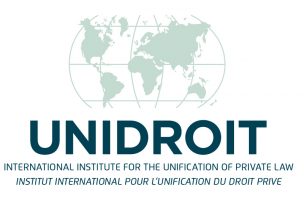Descrizione
In the last years, Force Majeure and Hardship have become “hot issues” for business, and many companies found themselves unprepared, not having provided adequate clauses in their contracts.
The lack of uniformity of domestic rules on the issue of Force Majeure is covered by existing international instruments, such as the ICC Force Majeure and Hardship Clauses and the UNIDROIT Principles of International Commercial Contracts.
The Conference analyse and discuss recent developments regarding force majeure and hardship, as well as possible adjustments to the standard clause, which may be appropri-ate in specific situations, such as in the context of the increase of raw materials price, in particular energy products.
Download here the presentations of the Speakers
Organized by:


Programme
Welcome
Anna Veneziano, Deputy Secretary-General, UNIDROIT
Barbara De Donno, Secretary General, ICC Italy
Ercüment Erdem, Erdem&Erdem, Istanbul; Chair of ICC Commission on Commercial Law and Practice
Chair: Fabio Bortolotti, Buffa Bortolotti & Mathis, Torino; Chair of ICC Italia Commission on Commercial Law and Practice
Introduction. Establishing appropriate rules on force majeure and hardship: the Unidroit Principles
Since their first edition, the UNIDROIT Principles have considered the need to provide rules on supervening circumstances adapted to international commercial practice. These default provisions (particularly those on Force Majeure and Hardship) which have already inspired national legislators, international model contracts and clauses, take party autonomy into account while also offering flexible risk-sharing alternatives. The presentation will look at how the UPICC can help parties and adjudicators find suitable solutions to contractual disruptions caused by supervening events.
Anna Veneziano, Deputy Secretary General, UNIDROIT
The 2020 ICC Force Majeure and Hardship clauses: an essential tool for business
International traders tend to deal with force majeure events through appropriate contractual clauses. The CLP Commission of the ICC has worked out standard clauses on force majeure and hardship for international commercial contracts.
- The decision to provide a “long form”, that can be the basis for drafting a tailor-made FM clause, and a “short form”, to be included as such in the text of a contract
- The general definition of force majeure and the “listed events”
- The consequences of force majeure
- The ICC hardship clause
Ercüment Erdem, Erdem&Erdem, Istanbul; Chair of ICC Commission on Commercial Law and Practice
Common trends emerging in arbitral case law on force majeure
The approach of international arbitrators with respect to force majeure shows a remarkable trend towards the establishment of common principles with respect to the basic issues, like the interpretation and actual application of the three basic requirements (un-foreseeability, irresistibility and beyond the control of the parties) and the relevance of the assumption of risk by the affected party, for in-stance regarding procurement risk.
The quite uniform approach characterising arbitral case law can be explained by considering that the actual issues arising are more or less the same, whatever their legal and contractual background, which leads arbitrators to substantially similar solutions, in view of responding to the reasonable expectations of international traders.
Fabio Bortolotti, Buffa Bortolotti & Mathis, Torino;
Chair of ICC Italia Commission on Commercial Law and Practice
Force majeure and hardship in the context of price increases of raw materials and oil and gas
The increase in the cost of energy and raw materials has given rise to dramatic problems. In certain industries, companies are forced to stop production or suspend deliveries due to the shortage of components and delays in supplies by subcontractors.
In many of these cases, the force majeure defense is doubtful, considering that the procurement risk is normally to be borne by the party affected by the force majeure event. This could be a reason for developing force majeure clauses that expand the actual coverage of the force majeure exception in the above situations.
Parties may also analyse these situations in the context of hardship, according to the applicable law (where applicable) or through the negotiation of appropriate hardship clauses.
Jean-Paul Vulliety, Partner Lalive, Geneva
Emiliano Berti, Head of Legal & Compliance, Europe, Nokia
Q&A
Coffee break
The view of business on the 2020 ICC Force Majeure and Hardship Clauses 2020
A panel of in-house counsels will analyse the ICC Force Majeure and hardship clauses and in particular issues which may require further drafting when adapting the clause to specific situations, like the following:
- The relationship between the “listed events” (“Presumed Force Majeure Events”) and the general definition of Force Majeure
- The possible choice of events to be included or excluded from the list
- The conditions for terminating the contract due to force majeure
- The alternatives provided by the ICC hardship clause in the absence of a negotiated solution: adaptation by a third party, termination by a third party or by one of the parties
Chair: Gabriella Porcelli, General Counsel, Chief Compliance Officer & Board Secretary, Iveco Group N.V.
Marina Mercante, Head of International Legal Assistance, Eni Plenitude S.p.A. Società Benefit
Edoardo Marcenaro, Head of Legal & Corporate Affairs Enel Grids srl; Member of the ICC Italia Commission on Arbitration & ADR
The need to adapt hardship clauses to the circumstances of the case – Drafting tailor-made clauses
Standard hardship clauses (or rules of law on hardship) are not always appropriate for specific situations, especially when it comes to entrust a third party (arbitrator) to adapt the contract conditions.
Parties may need to develop more detailed clauses in order to:
- Take into account the specific circumstances that are likely to affect the balance of their respective obligations;
- Provide guidelines and procedures for negotiating the revision of the contractual obligations;
- Establish criteria for choosing the third party asked to adapt the contract;
- Define the boundaries within which the third party can impose the adaptation for the contractual obligations.
Pascale Accaoui Lorfing, Research Associate CREDIMI, University of Burgundy; Lecturer at ESCP Business School Paris
Recent events giving rise to force majeure and hardship issues: Covid-19 and economic sanctions
The outbreak of the Covid-19 pandemic has brought about a systemic interference with contractual performance. One critical issue has been that of ascertaining the existence of the requirements of force majeure and in particular the unavoidability of the impediment and the non-assumption of risk.
Another front-burner topic is to what extent economic sanctions are applicable or relevant in the context of contract remedies to supervening events.
Giacomo Rojas Elgueta, D|R Arbitration & Litigation, Rome; Professor of Private Law,
Università degli Studi Roma Tre
Questions and answers
Conclusions
Maria Beatrice Deli, Chair of ICC Italia Commission on Arbitration & ADR;
Secretary General, AIA-Associazione Italiana per l’Arbitrato










